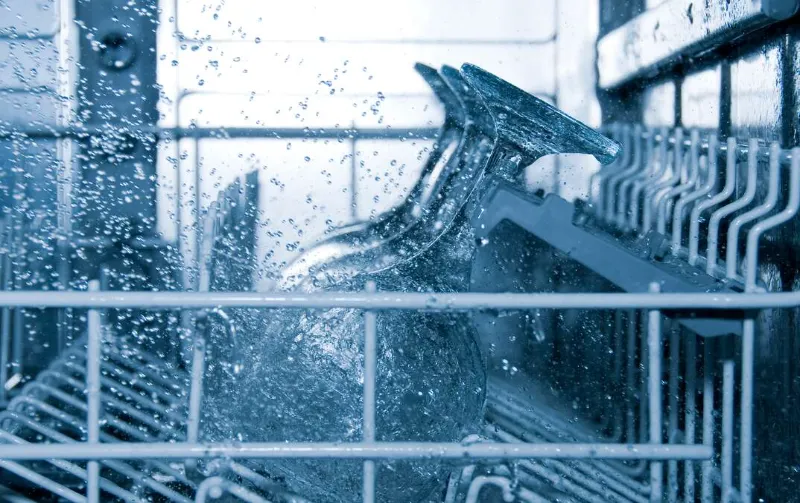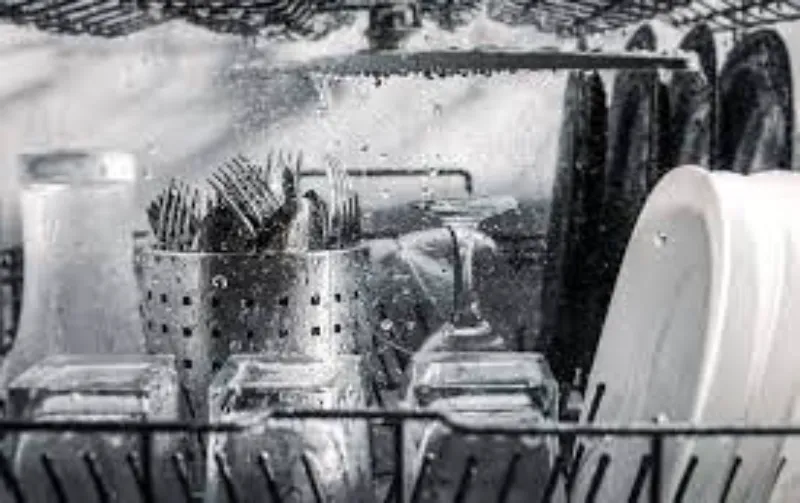Dishwashers are generally efficient, using less water than hand washing. Modern dishwashers can use as little as 3 gallons per load.
Dishwashers have become an essential appliance in many households, promising sparkling dishes with minimal effort.
Gone are the days of standing over a sink for hours; now, one can simply load up the machine, press a start button, and walk away.
Such convenience often raises questions about resource usage, particularly regarding water consumption.
The efficiency of dishwashers can vary, but many contemporary models are designed to conserve water.
They not only save time but also help in reducing your ecological footprint.
Energy Star-rated dishwashers, for instance, exceed the performance of traditional dishwashers, ensuring that dishes emerge clean while using less water and energy.
This makes them a smarter choice for the environmentally conscious consumer aiming to cut down on utility bills and water usage.

Understanding Dishwasher Water Consumption
Are dishwashers lavish water guzzlers or unlikely conservation heroes?
The question of water usage in dishwashers versus traditional handwashing methods is a topic of much debate.
Let’s dive into the facts to determine if running a dishwasher really signifies waving goodbye to water efficiency.
Average Water Consumption Of A Dishwasher
Considering the variety of dishwashers on the market, the average water consumption for a standard cycle can vary.
Modern energy-efficient models are designed to use significantly less water.
They typically sip between 3 to 4 gallons (roughly 11 to 15 liters) per cycle.
Older models or those without an Energy Star rating may demand up to 10 to 15 gallons (approximately 38 to 57 liters).
It’s crucial to acknowledge that advancements in dishwasher technology are continually improving water efficiency.
Comparing Dishwasher Water Usage To Handwashing
Handwashing dishes is often perceived as the more eco-friendly practice, but is this notion accurate?
Consider these points:
- A running tap may pour out 2 gallons of water per minute.
- Thoroughly washing a full sink of dirty dishes by hand can consume 20 gallons or more.
- Washing dishes under a continuously running tap can use even more.
By contrast, energy-efficient dishwashers can clean a full load using a fraction of that amount.
A key variable here is user behavior—some individuals might use minimal water through careful handwashing, whereas others might leave the tap running.
Regardless, the consensus among studies generally leans towards dishwashers, especially modern ones, being more water-conserving than the typical manual washing method.
To optimize your dishwasher’s water use, consider the following actions:
- Run full loads to maximize efficiency.
- Select the eco-friendly cycle if available.
- Avoid pre-rinsing dishes under running water.
To summarize, dishwashers, particularly newer, energy-efficient models, do not necessarily use a lot of water and can actually be more water-conservative than handwashing dishes, contingent on how one uses them.
Factors Influencing Dishwasher Water Consumption
Understanding the Factors Influencing Dishwasher Water Consumption is crucial for those mindful of their environmental impact and household utility bills.
These factors dictate not only how much water your dishwasher uses per cycle but also the overall efficiency of your appliance.
From the type of unit you have to the settings you choose, several variables play a role in the amount of water your dishwasher requires.
Let’s dive into the primary aspects that determine water usage in dishwashers and what you can do to optimize consumption.
Type Of Dishwasher
The design and model of your dishwasher significantly influence water usage.
Standard-sized models may consume more water compared to compact ones, due to their larger capacity.
On the other hand, features like soil sensors can adjust the cycle based on how dirty the dishes are, potentially saving water.
- Typically, these have a higher capacity and may use more water per cycle compared to smaller, portable units.
- Tend to be more water-efficient owing to their smaller size and smaller dish-load.
- Offer flexibility with single or double-drawer options, which can result in water savings when running smaller loads.
Cycle Selection
Picking the right cycle for the job isn’t just about how clean your dishes get—it also affects how much water your machine uses.
Heavy cycles geared towards tough, baked-on grime will use more water, while lighter or eco-friendly cycles are optimized for saving water.
| Cycle Type | Approximate Water Usage |
|---|---|
| Heavy | 4-6 gallons |
| Normal | 3-4 gallons |
| Eco | 2-3 gallons |
| Rinse | 1-2 gallons |
Note that the figures above are average estimations and can vary based on your specific dishwasher model and brand.
Efficiency Of Modern Dishwashers
Advancements in technology have made modern dishwashers more water-efficient than ever.
Look for models with Energy Star certification—a mark that ensures they meet or exceed criteria for water efficiency.
These dishwashers leverage innovative technology to cleanse effectively with less water.
- Detects the level of dirt and adjusts the water volume to match the cleaning needs.
- Designed to maximize cleaning power without requiring extra water.
- Allows the appliance to tailor water usage based on how full it is.
An Energy Star-certified dishwasher can use as little as 3 gallons per cycle, showcasing the strides taken in sustainable appliance design.
Environmental Impact Of Dishwasher Water Usage
The discussion around the environmental impact of dishwasher water usage is essential in a time when the conservation of natural resources is paramount.
Traditional handwashing methods have long been the norm, but with technological advances, dishwashers have become more accessible and raised questions about their sustainability.
Understanding the implications of using a dishwasher not only on our water bills but also on the environment is crucial for making informed decisions.
Comparison To Traditional Handwashing
Dishwashers have often been pitted against the method of handwashing dishes, with many questioning which practice comes out on top in terms of water efficiency.
A comparison between the two reveals some interesting insights:
- Modern dishwashers are designed to be efficient, using less water than one might expect.
- Handwashing dishes can consume up to 27 gallons per load, depending on the method used.
- Dishwashers that are Energy Star-rated use as little as 3 gallons per cycle.
Not only does this present an apparent benefit in water usage reduction, but using a dishwasher can also translate to positive environmental impacts due to less water demand and a potential reduction in waste water.
Water-saving Tips For Dishwasher Use
Optimizing dishwasher use to ensure water conservation involves more than just running a load.
Here are some water-saving tips to enhance the environmental friendliness of using a dishwasher:
| Tip | Description | Benefit |
|---|---|---|
| Load Efficiently | Arrange dishes in a manner that fits more items without overcrowding. | Reduces the need for multiple cycles. |
| Use Eco-Mode | Engage eco-friendly settings if available on your machine. | Decreases water and energy used per cycle. |
| Avoid Pre-Rinsing | Scrape but do not rinse dishes before loading them. | Saves on the water that would be used during rinsing. |
| Regular Maintenance | Clean and service your dishwasher regularly. | Ensures optimal performance and efficiency. |
Embracing these practices not only extends the life of your dishwasher but also contributes to a more sustainable lifestyle.
The key takeaway is that dishwashers when used correctly, can be a part of a water-conserving household.

Dispelling Common Misconceptions
When discussing household appliances and their environmental impact, the dishwasher often falls under scrutiny.
A prevailing notion suggests that dishwashers are water hogs, gulping down precious resources with every cycle.
However, this belief doesn’t hold up under the latest research.
Let’s wash away these falsehoods and shine a light on how modern dishwashers can actually save water and be more efficient than manual washing.
Debunking Myths About Dishwasher Water Usage
The myth that dishwashers use excessive amounts of water continues to persist, yet evidence shows a different story.
Contemporary dishwashers have surpassed their older counterparts with impressive efficiency gains. To provide clarity, consider these points:
- Advanced models can use as little as 3 gallons per load.
- Hand-washing dishes for the same load can consume up to 27 gallons.
- Energy Star-rated dishwashers optimize water consumption, faring better than most manual methods.
So, while it might seem counterintuitive, trusting a modern dishwasher can lead to significant water conservation in comparison to the sink-and-sponge approach.
The Truth Behind Water-saving Technologies
Innovations in dishwashing technology are pivotal in reducing water usage.
Manufacturers have rolled out features that not only conserve water but also maintain cleaning efficacy.
Let’s delve into these key advancements:
| Technology | Description | Impact on Water Usage |
|---|---|---|
| Soil sensors | Automatically adjust the cycle based on how dirty the dishes are. | Prevents unnecessary water usage through precise measurement. |
| Efficient jets | Target the cleaning power to where it’s needed most. | Reduces overall water usage while improving cleaning performance. |
| Eco-friendly cycles | Optimize energy and water consumption for lighter loads. | Minimizes water use without sacrificing cleanliness. |
Dishwasher technology has evolved, embracing a future where water conservation is a priority.
By selecting a dishwasher with these advanced features, you actively contribute to reducing unnecessary water waste in your daily routine.
Frequently Asked Questions For Does Dishwasher Use A Lot Of Water
How Much Water Does A Dishwasher Use?
Dishwashers typically use between 3 to 6 gallons of water per cycle.
Is Dishwasher More Water-efficient Than Hand Washing?
Modern dishwashers can be more water-efficient than hand washing, using less water for the same amount of dishes.
What Factors Affect A Dishwasher’s Water Usage?
Water usage in dishwashers depends on the model, age, load size, and chosen cycle settings.
Can Dishwasher Cycles Reduce Water Consumption?
Eco-friendly dishwasher cycles are designed to reduce water consumption while still effectively cleaning dishes.
Conclusion
Wrapping up, the myth that dishwashers guzzle water is debunked.
Modern units are designed for efficiency, using less water than manual washing.
For eco-conscious homes, investing in an energy-star-rated dishwasher is a smart move. Embrace this appliance for saving water and your valuable time.
Choose wisely, and wash efficiently!
